March 15 opens a new phase in this year’s primary season. Voters in five states will head to the polls to help determine the Republican and Democratic presidential nominees, but the two big ones — Ohio and Florida — are winner-take-all on the GOP side.
That means whoever wins those states wins all of their delegates. Florida and Ohio also happen to be the home states of Marco Rubio and John Kasich, respectively. They desperately need wins to keep their campaigns going.
These states are also ground zero for efforts to stop Donald Trump from winning the Republican nomination outright. If Trump wins one or both states, vacuuming up all their delegates, his path to the 1,237 required to clinch the nomination becomes much easier, Ted Cruz’s becomes much harder and everyone else’s becomes nearly impossible.
Trump can either take a big step toward victory or Cruz can eat away at his delegate lead, setting himself up to compete at a brokered convention and maybe even beat the billionaire in the primaries. For Rubio and Kasich, it is likely win or go home.
On the Democratic side, Bernie Sanders hopes he can replicate his Michigan success in Ohio: press his populist economic message and win over enough union voters to compete in a racially diverse state. Hillary Clinton still has a big delegate lead, padded by “superdelegates,” Democratic leaders who get to vote as free agents at the national convention, not allocated by any state or bound to any candidate.
The superdelegates overwhelmingly favor Clinton. She has also won more primaries than Sanders. Continuing to win will make it impossible for the Vermont senator to ever catch up. Democrats don’t have winner-take-all states that would allow him to make up his delegate deficit with a few big wins.

Voters in Florida, Ohio, Illinois, Missouri and North Carolina will head to the polls on March 15 to help determine the Republican and Democratic presidential nominees.
March 15, therefore, will most likely mark a turning point for all six candidates for this cycle’s unprecedented contest. It also represents what could be considered the third stage of this primary season.
The first stage began in early 2015, and featured jousting between 2008 candidate and 2012 nominee Mitt Romney and Jeb Bush. After Romney bowed out Jan. 30, Bush surged to a lead in national polls and his supporters raised some $100 million. He officially announced June 15.
The second stage began the next day, when Trump announced his candidacy and denounced Mexican illegal immigrants as “rapists.” Trump’s defiance of political correctness and celebrity status gave him gobs of cable TV time and by mid-July the lead in national polls. Republican insiders expected him to fade. But he didn’t.
Instead, Trump’s celebrity has helped Republican debates attract huge audiences — triple the previous record — but none of his rivals went after him. Instead they attacked apparent competitors in their “lanes.” Trump lost the Iowa caucuses to Cruz Feb. 1, but won big in New Hampshire Feb. 9 and South Carolina Feb. 20.
In the Feb. 25 debate, Rubio and Cruz battered Trump. He still won seven of the 11 Super Tuesday contests March 1, but his percentages and delegate counts fell short of a majority. On March 3, Mitt Romney denounced Trump and urged voters to support the candidate with the best chance of beating him in their states, to stop him from getting the majority of delegates.
On March 5, Trump lost two caucuses badly and won two contests narrowly; voters seemed to be taking Romney’s advice. On March 8, voters seemed to ignore it as Trump won the Michigan and Mississippi primaries. Cruz, meanwhile, has had the most success competing with Trump but hasn’t done as well in the South or in primaries, as opposed to caucuses, as expected.
Here is a detailed look at the third stage, the five states in play for both sides. Republicans have 367 delegates at stake, the Democrats 792 delegates. The results will set the tone for the rest of the campaign.
Florida
For Rubio, and perhaps the Republican Party, it all comes down to Florida.
The senator needs to win his home state to remain viable in what has become an underdog bid for the Republican presidential nomination. Rubio’s fate also could shape the future of the GOP. His loss likely equals victory for front-runner Trump. The New York celebrity businessman, by winning all 99 of Florida’s delegates to the GOP’s July nominating convention in Cleveland, would be positioned as clear favorite for the party’s presidential nod.
“If we win Florida, believe me, it’s over,” Trump said in early March, during a campaign rally in Orlando.
Rubio trailed Trump in most Florida polls heading into the March 15 primary. The former speaker of the Florida state house of representatives had narrowed the gap with the billionaire reality television star, and his campaign and its supporters were confidently predicting victory. But Rubio was fighting strong headwinds. He has suffered a string of losses in caucuses and primaries this month, creating an aura of futility when momentum is critical.
Rubio also has to contend with Cruz, who is angling to siphon votes from Rubio in Florida and knock him out of the race by denying him the home-state win. The strategy is risky, and Trump would probably benefit the most. It’s just another in the mounting number of challenges Rubio has to overcome — a long list that includes the continued presence in the race of Kasich.
“Our goal is to win. We have a 50-state strategy and it’s paying off across the country,” Cruz campaign spokeswoman Alice Stewart said. “We’re not just making the case that we can take on and beat Trump, but that as the nominee we will take on and beat Hillary. That’s why it’s important to compete in Florida and Ohio and … everywhere else.”
Rubio has conceded his “underdog” status in interview after interview. He likens his campaign for Florida’s 99 delegates to his successful long-shot race for the Senate in 2010 against Charlie Crist, then the popular sitting Republican governor. His campaign told the Washington Examiner in March that Florida is a “must-win and a will-win,” simultaneously stipulating to the high stakes while guaranteeing victory.
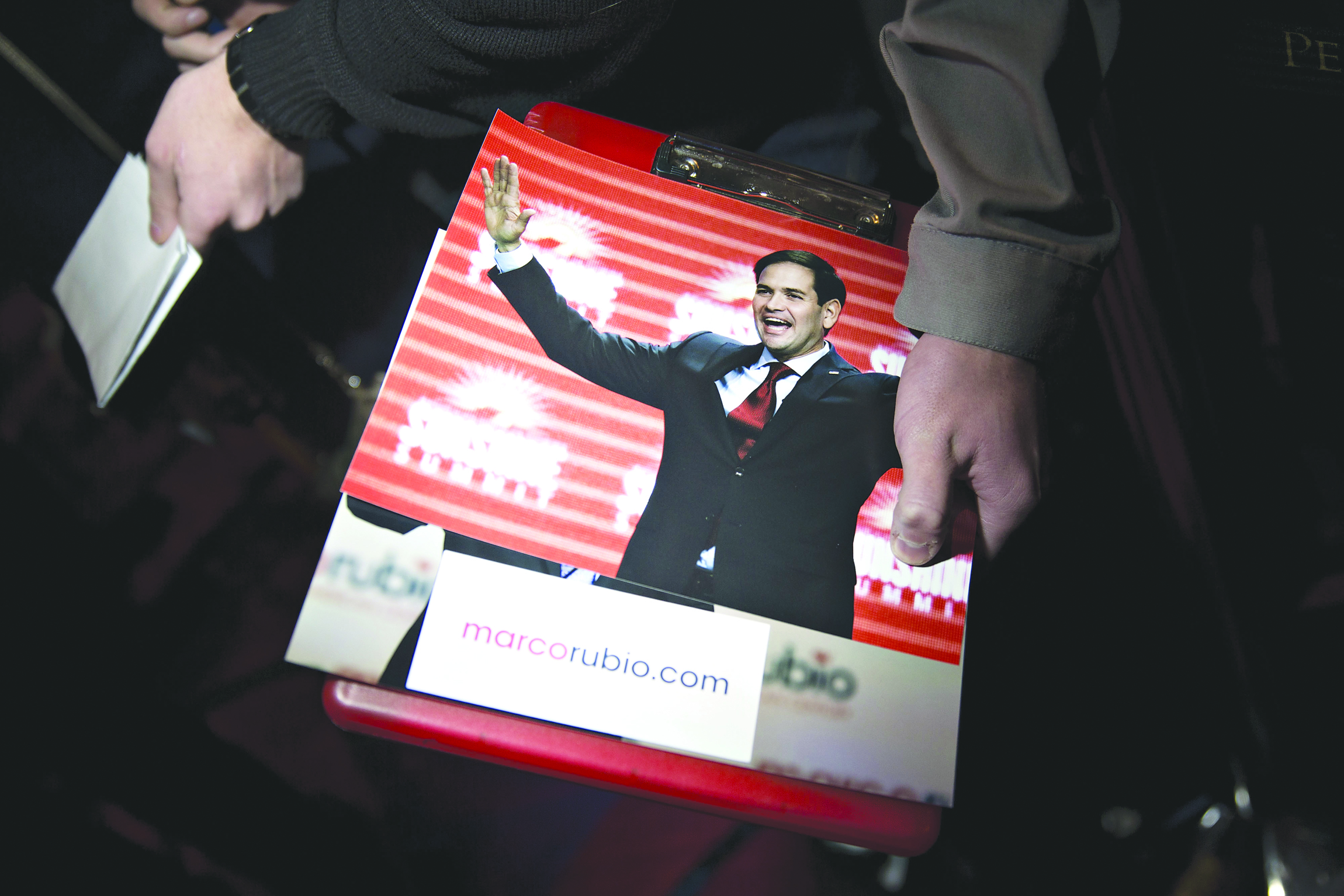
For Marco Rubio, and perhaps the Republican Party, it all comes down to Florida. (AP Photo)
The senator’s supporters claimed confidence due to the more recent polling that showed Trump leading by single digits, an improvement from February, and because of what should be natural advantages. Rubio is based in South Florida, home to a Republican-leaning community of Cuban Americans that includes the senator among its immigrant success stories. Among Rubio’s other potential strengths:
- He has shown an ability to close strong and win late deciding voters.
- He’s spending more time in Florida than Trump.
- Cruz and Trump could split the vote in the Panhandle of Florida, the region of the state least friendly to Rubio.
- Early voting in Broward and Dade counties has been strong, and that should be welcome news to Rubio
- Outside groups, including multiple anti-Trump super PACs and the super PAC supporting Rubio, are spending millions in Florida to derail Trump there.
“I think we’ll end up with a Marco win,” said Rick Wilson, a Republican strategist in Florida who is rooting for Rubio.
That last bullet point could prove pivotal. Trump was spending little on paid advertising (it was unclear if the Rubio attack ad his campaign produced was on the air or just unveiled for the benefit of garnering earned media.) The money being spent against Trump by Our Principles PAC, America Future Fund and the pro-Rubio Conservative Solutions PAC, ran into the million dollars, in a large state that requires large quantities of paid ads.
With Trump showing vulnerability in recent caucuses and primaries where he was pushed to the limit or lost, mostly to Cruz but also to Rubio, Florida could turn into another trouble spot.
On primary day, there are key locales to watch as the returns come in to gauge the outcome of the race. If Rubio is having a good night, look for him to be leading in southern Florida around Miami; northern Florida around Jacksonville; in Orlando and Tampa and along the Interstate-4 corridor that connects them; along the I-10 corridor and in southwestern Florida, on the Gulf Coast.
“Marco knows how to win as underdog in Florida; he did it in 2010 and he’ll do it in 2016,” Rubio campaign spokesman Alex Conant said. “From the moment we kicked off our Florida campaign in Miami on March 1, we’ve been entirely focused on winning our home state. Florida elections are famously close, but we are confident that Marco has the momentum and will finish strong.”
The Sunshine State also offers a key piece of the electoral puzzle for any Democratic nominee.
Win here in the general election and Sanders or Clinton can deny Republicans 29 electoral votes that are crucial to hopes they have of reaching 270. Outside of Texas, Republicans just don’t have as many big states they can bank on as do the Democrats, who can count on California, among others. The Democratic primary offers both Clinton and Sanders the chance to make a statement.
The state skews older and, in the Democratic primary, African-American voters are influential. This should make Florida natural Clinton territory. Win here and her advantages over Sanders become more entrenched. For Sanders, improving his numbers with seniors and African-Americans could dent Clinton’s inevitability.
Winning the Democratic primary in Florida also could put Clinton or Sanders in a position of strength not only because they have proven viability in an important swing state, but because they’ll probably be able to point to inroads with the seniors and African-Americans they’ll need to run up the score against the eventual Republican nominee.
“It’s important because it’s such a big state,” said a Democratic strategist with Florida ties.
Ohio
On paper, Kasich looks like an unlikely hero for the #NeverTrump movement. He finished higher than fourth place in three of the first 21 contests of the Republican race. His best showings were distant second-place finishes in New England primaries.
Kasich received little boost from running second in New Hampshire. In Michigan, where he was supposed to compete for his first win, he actually ended up in third place. Politically, Kasich has transformed from the government-cutting House Budget Committee chairman who helped deliver the first balanced federal budget since 1969 into the Ohio governor who rammed through Obamacare’s Medicaid expansion in his state and suggested fiscal conservatives who disagreed with him had different priorities than Jesus.
Yet Kasich is better positioned than any other candidate to stop Trump on March 15. Unlike Rubio, he continues to lead in most polling of his home state. A Fox News survey released the week before the primary showed Kasich leading Trump by five points and enjoying a 79 percent job approval rating among Ohio Republicans. Only 15 percent disapproved.
While Trump has considerable grassroots enthusiasm behind him, he has occasionally been beaten by candidates with superior organizations. Ohio is a big and diverse state, with three major cities — Cleveland, Columbus and Cincinnati — that are culturally distinct and occupy separate media markets.
Kasich seems up to the challenge. He was elected to Congress nine times and has won the governorship twice. Less than two years ago, he was re-elected carrying 86 of Ohio’s 88 counties, 47 of them with at least 70 percent of the vote.

John Kasich is better positioned than any other candidate to stop Trump on March 15. (AP Photo)
“Kasich’s organization does give him a great shot at out-organizing the other candidates,” said Joan McLean, emeritus professor of politics and government at Ohio Wesleyan University, located in Kasich’s Columbus-area former congressional district. She said the Medicaid expansion actually helps Kasich with moderate Republicans while conservatives might be somewhat mollified by his signing of a bill defunding Planned Parenthood.
“I don’t think losing in other places will hurt him, especially for those who are part of the stop-Trump movement,” McLean added. “Some may go for Cruz, but he’s not putting in the resources in Ohio to attract them.”
“The party organization is 1,000 percent behind Kasich,” said Jim Trakas, former Ohio House majority whip and a onetime chairman of the Cuyahoga County Republican Party. But Trakas cautioned against sleeping on Trump, whom he said has had paid staff on the ground in the state since January.
To explain Trump’s appeal in Ohio, Trakas, now an Independence city councilman, told the story of his friend Tony. “A Democratic operative, very involved with Bill Clinton, not a fan of Hillary Clinton, he employs 32 union construction workers,” he said. “Every one of them is voting for Trump.” So is Tony.
Trakas compared it to the 2000 primary between George W. Bush and John McCain, where a lot of people who don’t usually vote Republican participated. “They’re Reagan Democrats, probably wouldn’t call them Bush Democrats by any stretch of the imagination,” he said. “That’s the wild card.” He added that some evangelicals concentrated in the southwest and the more traditional religious right are for Cruz, but most social conservatives don’t find either Kasich or Trump offensive.
Clinton’s camp, meanwhile, is likely worried about her chances after unexpectedly losing Michigan to Sanders. “Trade issue could hurt her in some key areas of the state,” said McLean, who was once an adviser to 1984 Democratic vice presidential candidate Geraldine Ferraro. [She] could lose some votes to Trump because Democrats can request Republican ballots.”
“Again, minority turnout will be key, especially in the Cleveland area,” she said. “Must be some concern that this group did not vote in the numbers necessary for [former Democratic Ohio Gov. Ted] Strickland to win re-election and thus Kasich won the governor’s race.” Ohio State University is on spring break, which could hurt Sanders’ turnout.
Strickland is running for the Senate against GOP incumbent Rob Portman this fall. He doesn’t face a competitive primary, but there is competition among Republicans running in former House Speaker John Boehner’s district. Early voting means many cast ballots before they could be swayed by Michigan or anti-Trump activism.
Illinois
Trump and Clinton appear poised to comfortably take Illinois, which could end the races of some other candidates if they seem unable to win in an ethnically and politically diverse state.
Illinois distributes 15 delegates to the winner of the state. The other 54, however, are directly elected by the voters in each congressional district. The delegates are pledged to presidential candidates.
This means that candidates can’t win in Chicago and expect to get all the state’s delegates. Instead, Illinois poses the challenge of appealing to a diverse group of voters from urban Chicago to farms down state.
Thirty-three percent of voters, according to a Chicago Tribune poll released last week, support Trump. He has at least a 10-point lead over the rest of the GOP field. Cruz garners 22 percent of support, Rubio trails him slightly with 21 percent and Kasich rounds out the remaining candidates with 16 percent.
Chris Mooney, the director of the Institute of Government and Public Affairs at the University of Illinois, said Trump may appeal to a number of Illinois residents suffering under an economy where it’s main driver — manufacturing — is largely gone. He said many Republican voters in the state may be working-class whites who saw their father working at the coal mine or in the Maytag plant, both job opportunities that have since disappeared.
Trump’s anti-free trade, anti-immigrant and anti-establishment positions may tap into some of this anger, Mooney said.
“You look around and say, ‘My life sucks. It can’t be my fault. Donald Trump is telling me it’s somebody else’s fault, and I’m more than happy to listen,’ ” he said.
Illinois voters tend to be more interested in practicalities, not ideologies, and are attracted more to candidates who have concrete ways to get things done than to personalities.
“[John] Kasich is a classic candidate you would expect to do well in a regular year. He’s got experience, he’s what passes for moderate in the Republican Party these days, he’s Midwestern, he’s pragmatic,” Mooney said. “But this isn’t a regular year.”
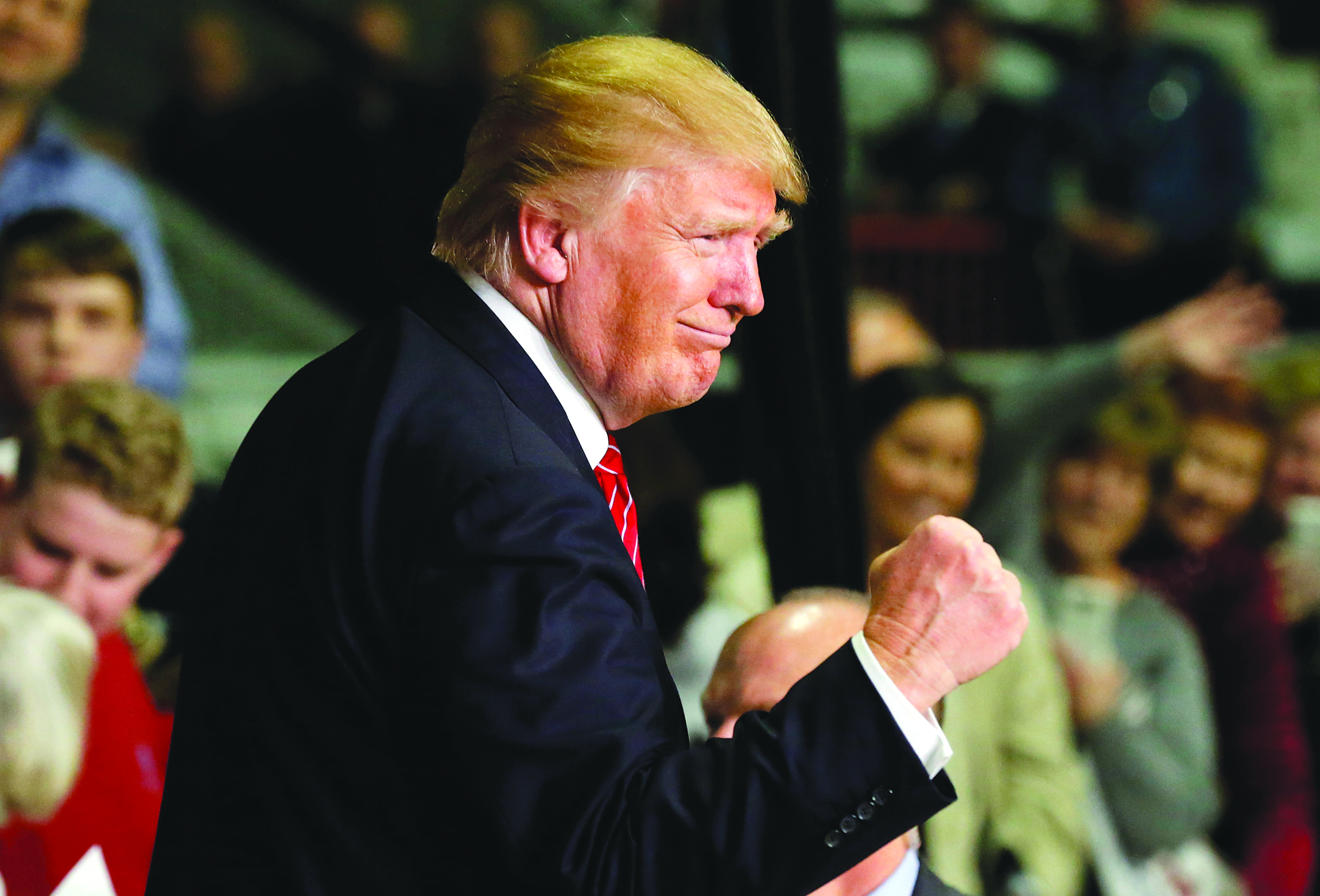
On March 15, Donald Trump can either take a big step toward victory or Ted Cruz can eat away at his delegate lead. (AP Photo)
Instead, voters are gravitating to Trump, who is heavy on personality and light on details of how he will fulfill his policy promises.
“That’s the whole problem with Trump everywhere. How is this guy getting anybody to take him seriously at all? His appeal is not to party regulars, his appeal is to the voter that’s not paying that close attention and who is mad. There’s lots of mad people,” Mooney said.
Jaime Dominguez, a lecturer in the political science department at Northwestern University, said Trump’s success will depend on his ability to bring out rural voters and evangelicals in the south of the state.
Dominguez also said he thinks Kasich and Rubio are “done in the state,” adding that Kasich’s ability to work with Democrats won’t appeal to Illinois voters. Dominguez said he expects Rubio to drop out by the end of the day on Tuesday to allow the establishment to coalesce behind Cruz.
When it comes to the other nomination race, a Chicago Tribune poll released last week showed that Clinton had a sizable lead over Sanders. It said 67 percent of those polled said they would vote for Clinton, compared to just 25 percent for Sanders.
Mike McKeon, an Illinois pollster, said the key to Clinton maintaining that lead when ballots are actually cast is whether African-Americans support her.
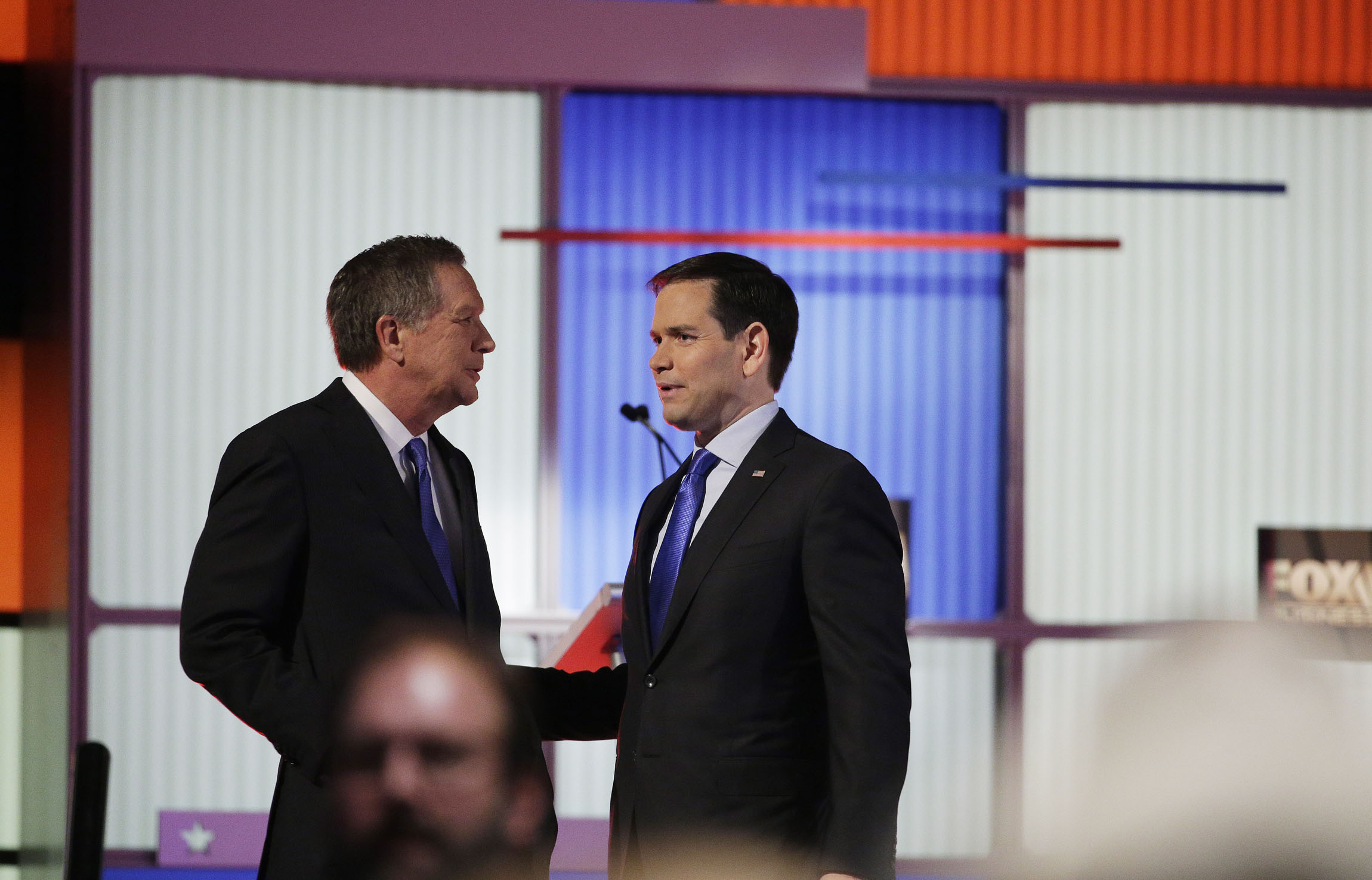
Jaime Dominguez, a lecturer in the political science department at Northwestern University, said he thinks John Kasich and Marco Rubio are “done” in Illinois. (AP Photo)
Clinton’s close ties to Rahm Emanuel could hurt her among African-American voters who dislike the Chicago mayor, McKeon said. On top of that, Sanders has been “working real hard” to gain support from college students in the Chicagoland area.
If these two things lead Clinton to underperform in the primary, the effect would be devastating in the state where she grew up, McKeon said.
“If Hillary can’t defend her own turf, we got a problem,” he said.
If, however, Sanders is crushed in Illinois, it could prove that he’s unable to succeed in politically diverse, large states and spell the end of his campaign, the pollster predicted.
“It’s nice for him to go to liberal states and get a good liberal votes, but this is a completely different story. Illinois is a big dynamic state,” he said.
Missouri
With the majority of eyeballs focused on primaries in Florida and Ohio, the Missouri primary has flown under the radar ahead of Tuesday’s elections.
After holding their caucuses early and leaving their delegates unbound in 2012, the state is set to matter once again and hand out 52 delegates. On the Republican side, all signs point to a fight between Trump and Cruz for the Show-Me State as a large swath of evangelicals take to the polls. With them comes a strain of populism that could help the GOP front-runner.
“There’s a fairly vibrant strain of populism in Missouri. Missouri is also a state that has a large number of social conservatives, and those voters tend to play a pretty large role in the Republican primary. I would expect this presidential primary to be no different,” said John Hancock, the Missouri Republican Party chairman.
Overall, the state is a hybrid primary. A candidate will take home all 52 of the state’s delegates if he clears the 50 percent hurdle. However, as Hancock put it, Missouri is “very likely” to divvy up the delegates by performance in the state’s eight congressional districts. Much of the GOP’s vote resides in rural parts of the state, giving the play for congressional districts more merit.
“There is a play here for everybody,” Hancock said. “[Candidates] can … try and take the whole-state approach or they can concentrate in media markets that speak to individual congressional districts.”
Having performed well with evangelicals throughout the GOP calendar thus far, some believe that Trump is set for a big night in Missouri. However, with a Democratic primary taking place simultaneously, Trump’s ability to peel off Democratic votes could be curtailed.
“My instinct is that Trump would appeal to the kind of social conservatives you have in Missouri,” said Kenneth Warren, a political science professor at Saint Louis University. “It’s a very socially conservative state in the rural area, where in the Republican primary, most of the votes are going to come from by far. I just see his appeal there.”
Despite Trump’s recent strength with evangelicals, Cruz’s campaign is looking to make a play in Missouri, and campaign manager Jeff Roe is running the show. A native of the Show-Me State, Roe built his political operation in St. Louis before taking over Cruz’s 2016 bid.
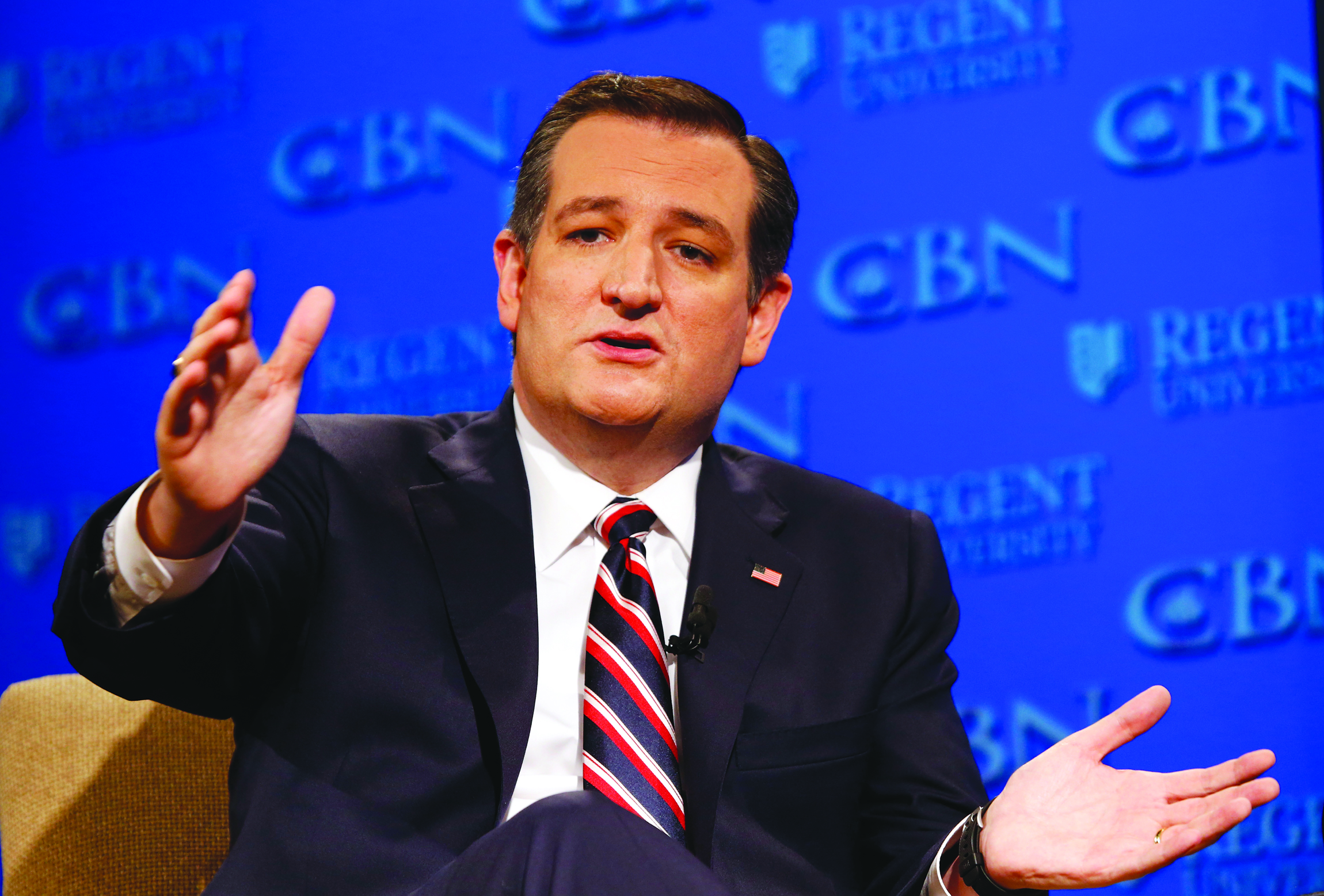
Despite Donald Trump’s recent strength with evangelicals, Ted Cruz’s campaign is looking to make a play in Missouri. (AP Photo)
Rubio and Kasich are unlikely to mount significant challenges as both focus on their home states.
As far as who’s going to win Missouri, it’s an open question. However, Trump’s momentum could give him the edge come Tuesday.
“Momentum in a primary, historically success begets success, and if this primary plays out according to history, you would think Trump would do very, very well going forward,” Hancock said. “However, I must confess, I’ve been doing this for 30 years. I’ve never seen a primary season like the one we’re dealing with right now.”
Clinton, meanwhile, appears to be set for victory. With turnout among African-Americans expected to be around 25 percent (according to Warren) and her strength in the south, Clinton is expected to win handily.
“Missouri has a low percentage of minorities, which gives Bernie somewhat of a shot. However, that’s overall. In the Democratic primary, obviously there’s quite a few,” Warren said, pointing to the St. Louis and Kansas City metro areas. “Another reason why Sanders doesn’t have much hope anymore is because of the bandwagon effect. He’s just not doing that well. He’s winning some states, but all the states that are coming up, if you look at the poll numbers — oh my gosh — he’s getting crushed.”
North Carolina
The North Carolina Republican primary could become the most contested in the Tar Heel State in a century amid record-high turnout expectations.
The state could serve as a swing state that changes the outcome of November’s general election, but its Republican voters will also play a much larger role in selecting their party’s nominee than in several recent elections past.
The primary will take place nearly two months earlier in the calendar than it did during the 2012 cycle, which has given voters much less time to make up their minds. But polling suggests Trump has a firm grip on the GOP primary electorate.
Jason Husser, a pollster and professor at Elon University, said he has little reason to doubt that Trump will win North Carolina.
“I could see some tightening, but I don’t see Trump going away,” Husser said. “Ben Carson was doing better in North Carolina than in most other states so depending on how that Carson vote splits between Cruz and Trump, I do think there’s room for Cruz in particular to exceed poll expectations in North Carolina. But I’d still be surprised if Trump wasn’t the winner.”
While the candidates may focus their attention elsewhere, North Carolina has more delegates up for grabs at this summer’s GOP convention than all other March 15 nominating contests with the exception of Ohio. The Tar Heel State’s 72 delegates account for nearly 3 percent of all Republican delegates.
The main motivating factor for Republicans deciding where those delegates go appears to be mistrust of government.
“When you have 92 percent of Republicans saying they don’t trust it most of the time, it’s not really a surprise in hindsight that they didn’t choose a candidate like Marco Rubio,” Husser said.
Trump, however, has crossover appeal to the Democratic Party. Husser said Trump has done “pretty well” among white Democrats, a group the pollster described as attracted to Trump for the same reason it found George Wallace appealing in the past. Wallace served four terms as Alabama’s governor, touted racial segregation, and unsuccessfully ran for president three times.
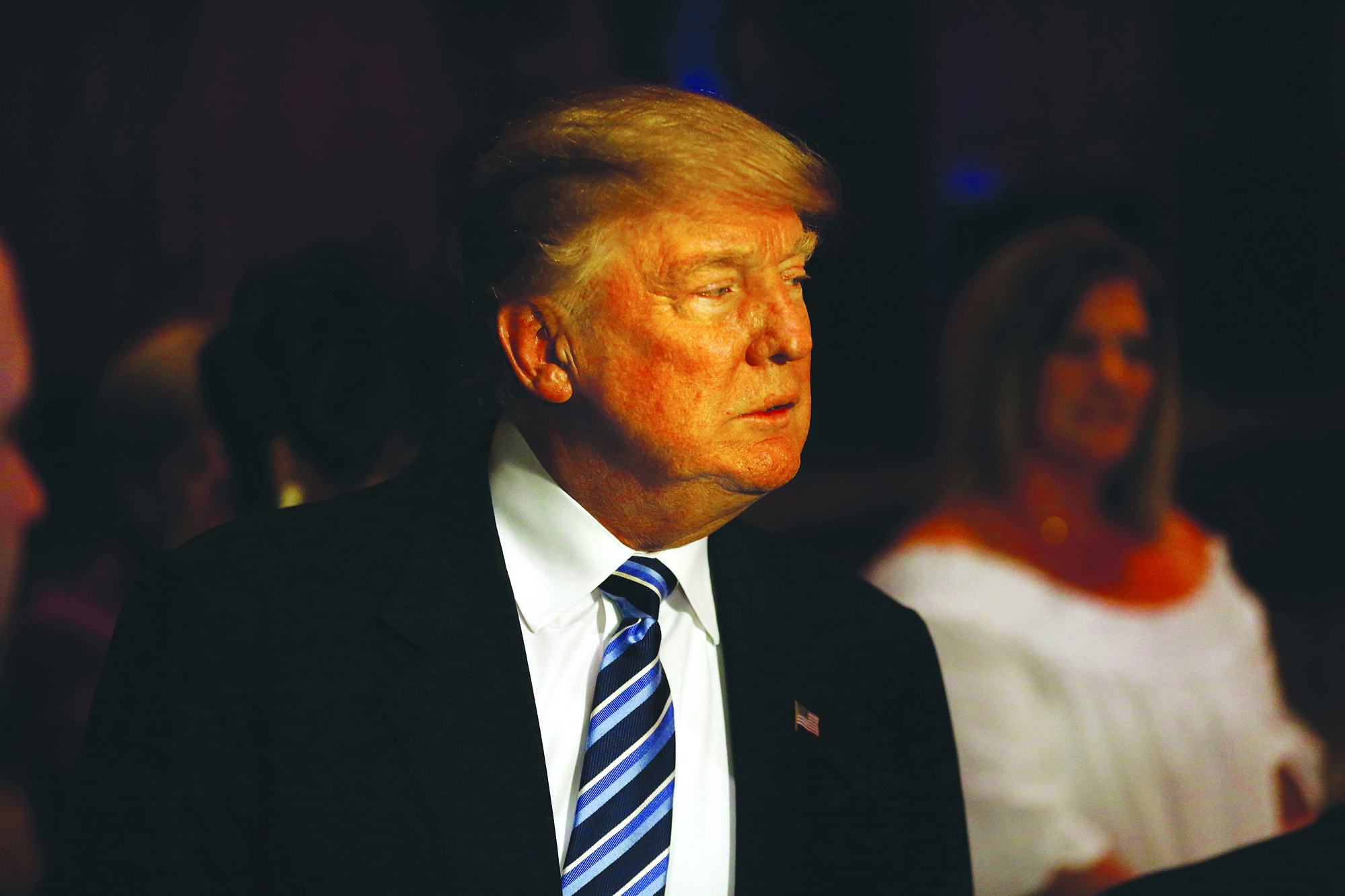
Jason Husser, a pollster and professor at Elon University, said he has little reason to doubt that Donald Trump will win North Carolina. (AP Photo)
While some Democrats may find Trump intriguing, many more are expected to lift Clinton to victory. Husser said the state’s African-American population and fewer “very liberal” voters present a large hurdle for Sanders to overcome in the Democratic primary.
“I would be shocked if he beat Clinton in this state and I would be surprised if he comes close,” Husser said.
But North Carolina has undergone numerous changes that could affect the outcome of both primaries in unpredictable ways. The state has grown, and an influx of residents from Virginia and Florida have made it more like an Atlantic state than a mid-South state such as Tennessee, Husser explained.
Tuesday also marks the first election under the state’s voter ID law, but voters without an ID can still find legal ways to cast their ballots. They can request absentee ballots up to a certain deadline, after which they may cast provisional ballots that would count in specific circumstances. Such voters may also have to identify on a government form the reason for their lack of an ID.
But Husser expects the voter ID law will not make much of a difference in the primaries. He noted that he expects above-average Republican voter turnout and relatively average Democratic turnout. More than 165,000 North Carolinians cast their votes in both primaries during the first four days of early voting, according to The News and Observer in Raleigh.
While residents of other states may watch Ohio and Florida closely on Tuesday, the results in North Carolina could grow in importance when the GOP convention kicks off in Cleveland this summer.
W. James Antle III, Michael Barone, David Drucker, Jacqueline Klimas, Ryan Lovelace and Al Weaver
